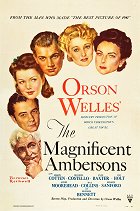Réalisation:
Orson WellesScénario:
Orson WellesMusique:
Bernard HerrmannActeurs·trices:
Joseph Cotten, Dolores Costello, Anne Baxter, Tim Holt, Agnes Moorehead, Ray Collins, Erskine Sanford, Richard Bennett, Orson Welles (narrateur) (plus)VOD (1)
Résumés(1)
A la fin du 19ème siècle, Eugene Morgan, issu d’une famille peu fortunée, est amoureux d’Isabel Amberson, jeune représentante de la haute bourgeoisie. Mais Isabel ne tarde pas à épouser un autre homme et brise le cœur d’Eugene. Quelques années plus tard, Eugene a fait fortune grâce à la révolution industrielle et répond à l’invitation d’Isabel qui donne un bal. Les retrouvailles sont chaleureuses entre les deux amis d’enfance. Ils se trouvent dans la même situation : tous deux sont veufs et ont un enfant unique. Alice, la fille d’Eugene, et George, le fils d’Isabel remarquent tout de suite l’attirance naissante entre leurs parents. Cela tourmente aussitôt George, qui refuse d’envisager que sa mère puisse se remarier. (LaCinetek)
(plus)Critiques (3)
At the time it was made, it was an above-average film both thematically and in its execution, but I find its reviews to be quite exaggerated. Essentially, it's a classic studio romance with the necessary happy ending at the end. But that's how it goes; famous directors have it easier with fans. If I overlook a few cuts and camera movements, Orson Welles didn't significantly impact the film. Overall impression: 55%. The film might be interesting for its perspective on the beginnings of motorism in the United States, with the prophetic commentary of Eugene Morgan.
()
It is quite recognizable that it is a film by Orson Welles, there is excellent camera work, a well-structured screenplay, and great acting, but unfortunately, it is somehow everything that left me rather cold. Perhaps I will have to give the film a second chance later, just like I did with "Citizen Kane".
()
I have no doubt that the original director’s cut was a polished gem, but unfortunately, I must rate only the shorter version, which is not bad and clearly shows the revolutionary touch Welles had for staging and lightning the mise-en-scène, and yet I cannot ignore the fragmentary impression it gives; it takes quite awhile for the viewer to fully get their bearings around the characters and their relationships. But I think it’s unfair to be more critical, both because of the suppression of Orson’s full vision and also because of the unarguable narrative qualities The Magnificent Ambersons has retained despite the meddling of the studio.
()


Annonces